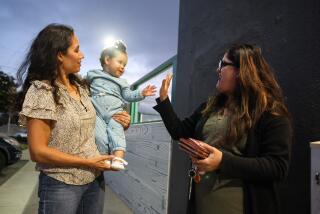SOUTH-CENTRAL : Orthopedic Program Knows No Borders
- Share via
A smile and a hug from a grateful patient is the best Christmas present Brad Greenbaum has gotten this season.
Greenbaum, a resident surgeon at the Los Angeles Orthopaedic Hospital Foundation, operated on a 13-year-old boy from Mexico who had an affliction that forced him to walk with his knees bent.
“They brought him up here (in mid-October) and I did an operation to straighten his knees,” said Greenbaum, 29, a USC medical school graduate.
As a member of a team of volunteer doctors from the Orthopaedic Hospital on South Flower Street, Greenbaum saw the boy again last week when he flew to Calexico, Calif., to treat other crippled children and their families as part of the hospital’s International Children’s Program.
“He knew I was one of the people that operated on him. When I saw him in the clinic, I saw him with his knees straight,” said Greenbaum, adding that the boy raced to greet him. “He had a huge smile on his face. . . . He gave me a hug and said ‘thank you’ (in Spanish).”
That wasn’t the only gracias Greenbaum received on the visit.
He and two other doctors treated 125 children in two days at the hospital’s Calexico satellite clinic on the international border. Through its program, composed of a staff of five doctors and eight to 10 volunteers and funded by private donors, the hospital has been treating about 2,000 patients a year for the past 30 years.
A group of volunteers go to Calexico once a month to screen patients and provide X-rays, casting and bracing services.
The purpose of the trips is to help Mexican children who cannot afford advanced medical attention, said Mary Beth McKee, one of the program’s organizers. All services provided by the volunteers are free. Children who need corrective surgery are taken to Los Angeles.
“There were families coming anywhere from Mexicali up to families that have traveled more than 40 hours to see us,” said Greenbaum. The group’s next trip will be Jan. 13-14.
Said Greenbaum: “It’s gratifying to know that we can help someone that would otherwise spend the rest of their lives with these deformities.”
More to Read
Sign up for Essential California
The most important California stories and recommendations in your inbox every morning.
You may occasionally receive promotional content from the Los Angeles Times.













